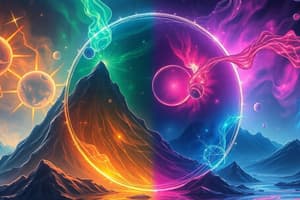Podcast
Questions and Answers
What are the three most common phases of matter?
What are the three most common phases of matter?
- Solid, Plasma, Gas
- Liquid, Gas, Vapor
- Solid, Gel, Plasma
- Solid, Liquid, Gas (correct)
The process of a solid changing into a liquid is called ______.
The process of a solid changing into a liquid is called ______.
melting
What is latent heat?
What is latent heat?
Latent heat is the amount of heat energy absorbed or released during a phase change.
Ice changes its temperature immediately when heated.
Ice changes its temperature immediately when heated.
What happens to the molecules of water as temperature continues to decrease?
What happens to the molecules of water as temperature continues to decrease?
What is boiling?
What is boiling?
The process in which a liquid changes into a gas at the surface is known as ______.
The process in which a liquid changes into a gas at the surface is known as ______.
Flashcards are hidden until you start studying
Study Notes
Phase Changes in Matter
- Phase changes occur when matter transitions between physical states: solid, liquid, and gas.
- Common phase changes include:
- Melting: solid to liquid
- Freezing: liquid to solid
- Vaporization (Boiling): liquid to gas
- Condensation: gas to liquid
- Sublimation: solid to gas
- Deposition: gas to solid
Latent Heat
- Latent heat refers to the energy absorbed or released during a phase change without changing temperature.
- When ice melts, heat is absorbed to break intermolecular bonds, allowing molecules to move freely.
- The temperature remains constant during this energy absorption until the entire solid is converted to liquid.
- As water cools, heat is released, leading to more tightly packed molecules and the formation of solid ice.
Melting
- Melting occurs when a solid is heated, increasing molecular kinetic energy and causing vibrations.
- The breaking of intermolecular bonds allows molecules to move apart, transforming the solid into a liquid.
Boiling
- Boiling transforms a liquid into gas due to increased temperature and pressure.
- Heat addition increases molecular movement and collision frequency, converting the entire liquid into gas.
Evaporation
- Evaporation is a process where surface molecules of a liquid gain enough energy to escape into the gas phase.
- This happens at temperatures below the boiling point, leading to a gradual loss of liquid.
Studying That Suits You
Use AI to generate personalized quizzes and flashcards to suit your learning preferences.



